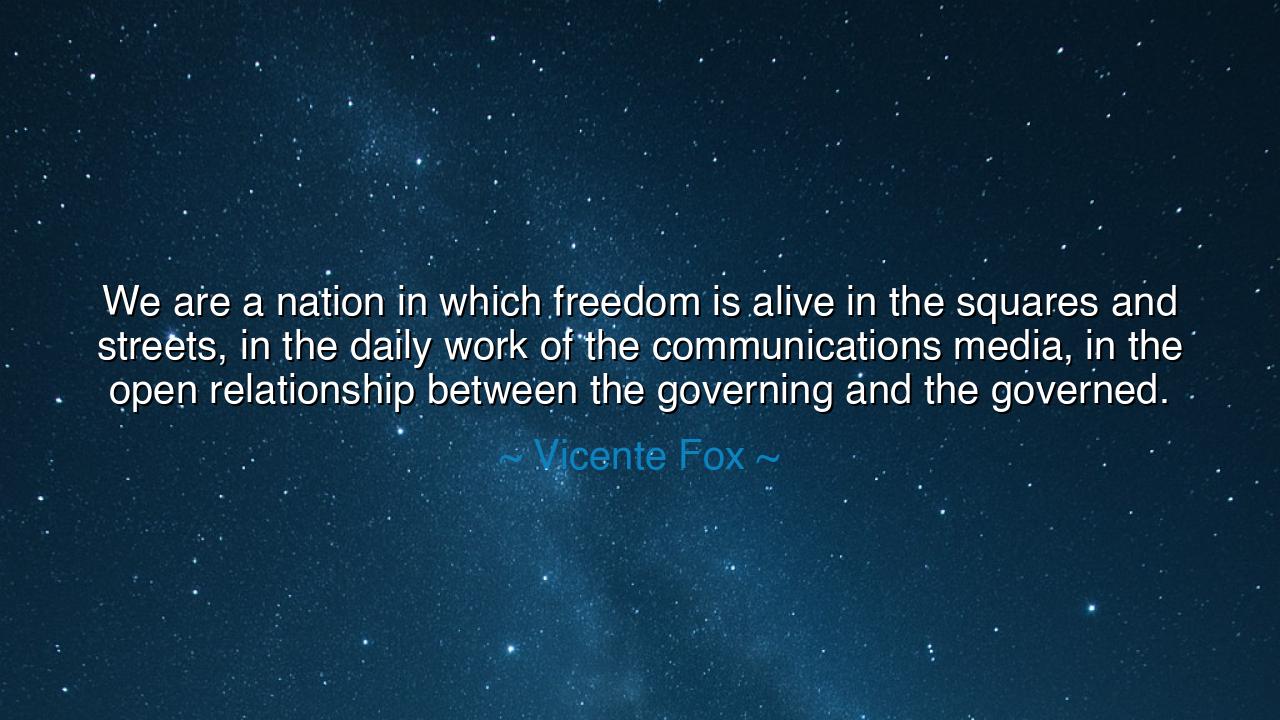
We are a nation in which freedom is alive in the squares and
We are a nation in which freedom is alive in the squares and streets, in the daily work of the communications media, in the open relationship between the governing and the governed.






The words of Vicente Fox, “We are a nation in which freedom is alive in the squares and streets, in the daily work of the communications media, in the open relationship between the governing and the governed,” resound with the vigor of a people awakened. Here he proclaims that freedom is not an abstract promise locked away in laws or constitutions, but a living force, visible in the rhythm of common life. When citizens walk the streets unafraid, speak in the squares unbound, and question power without fear, then liberty breathes truly.
At the core of these words lies the truth that a nation is alive not through its rulers, but through its people. Freedom must be woven into the daily work of society, into the voices of the media that carry truth, and into the relationship between those who lead and those who follow. If that bond is open, if dialogue flows, then governance is not tyranny but partnership. Thus, Fox paints liberty not as a gift from above, but as a covenant between equals.
The origin of this saying rests in Fox’s role as President of Mexico at the dawn of a new democratic era. His words reflect the spirit of transition from years of dominance by a single party toward a time when citizens demanded greater transparency, accountability, and voice. In declaring that freedom was alive, he sought to affirm the new life stirring in his nation, and to bind its people to the shared task of sustaining it.
Let this lesson endure: freedom is not secure if it lives only on parchment, nor if it is guarded only by law. It must walk with the people in their streets, speak with them in their squares, and shape the bond between the rulers and the ruled. Fox’s words remind us that liberty is a flame sustained daily, and that only when it burns in every corner of a nation can it truly be said to live.






LDLuong Do
Vicente Fox’s view of freedom is certainly inspiring, but I question whether it fully captures the challenges we face today. In a world of rapidly evolving media, how much of the 'freedom' we experience is manipulated or influenced by external forces like social media, fake news, or political agendas? Can we truly say the relationship between the governed and the governing is open, or does it feel more controlled than ever? How do we address these complexities while striving for greater freedom?
TMThanh Minh
I agree with the sentiment in this quote, but I wonder if true freedom can exist when there are still divisions between the governing and the governed. Is it enough for the relationship to be 'open,' or does there need to be a deeper sense of equality and shared power? How do we balance the freedom of expression with the need for accountability from both sides of this relationship, especially when societal tensions arise?
TVTuong Vy
This quote paints a beautiful picture of an open, communicative society where freedom thrives. But I’m curious about the practicality of this idea—how effective are the communication media in truly reflecting the voice of the people? Are we seeing enough transparency from our leaders, or is the relationship between the governed and the governing more complex than it seems? What measures need to be in place to ensure that this kind of freedom isn’t just an illusion?
NTNguyen Tu
Vicente Fox’s quote about freedom in the streets and communication media is thought-provoking, but it makes me wonder—how true is this for every citizen? While freedom might be alive in some areas, what about those whose voices aren’t heard, or those in marginalized communities? Can we truly say there is open dialogue between the governing and the governed, or is this idealistic? How can we ensure that freedom is not just a concept, but a reality for everyone?